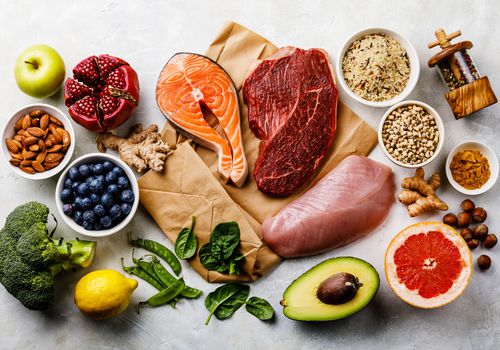When a person is sick, they may find it difficult to develop an appetite. However, it is important to receive nourishment and stay hydrated, especially when feeling unwell.
Different types of food can combat different types of illness. A person with a sore throat may benefit from foods that would not help someone who feels nauseous.
In this article, we provide a list of foods to eat and avoid for people with common illnesses.
Colds and flu

Herbal teas provide hydration, and breathing in their steam can help to clear mucus from the sinuses.
A blocked nose, a cough, and a sore throat are common symptoms of colds and flu. The following foods can help to ease congestion and inflammation and boost the immune system.
1. Herbal teas
When experiencing cold and flu symptoms, it is important to stay hydrated. Herbal teas are refreshing, and breathing in their steam can help to clear mucus from the sinuses.
Adding ground turmeric to a cup of hot water may help to relieve a sore throat. Research suggests that turmeric has both anti-inflammatory and antiseptic properties.
Tea leaves are abundant in natural plant compounds, such as polyphenols, flavonoids, and catechins. These stimulate the immune system. Catechins, in particular, may protect against certain types of influenza virus.
Some people recommend drinking Echinacea tea to shorten the duration of cold and flu symptoms. However, this effect has yet to be proven by scientific research.
2. Honey
A sore throat can be caused by a bacterial infection. Honey is rich in antimicrobials that help to clear these types of infection. Honey may also be effective in treating children’s coughs, though it should not be given to infants under 12 months of age.
A review published in 2018 compared honey with common over-the-counter children’s cough remedies, a placebo, and no treatment. The authors found that honey appeared to be more effective than diphenhydramine and salbutamol, which are drugs often used in cough medicines. Honey also produced similar results as dextromethorphan, another common ingredient.
The results were limited, however, as most studies in the review only looked at 1-night acute coughs.
3. Citrus fruits and berries
Citrus fruits, such as oranges, lemons, and grapefruits, contain high levels of flavonoids and vitamin C. These decrease inflammation and boost immunity, which may help to fight a fever.
Some studies suggest that a flavonoid called quercetin, which is also found in berries, may help to treat rhinovirus infections. This virus is responsible for the majority of common colds.
Frozen, slushy fruit juices can often help to soothe a sore throat.
Foods to avoid
Dairy is believed by many to increase mucus production, although there is little scientific evidence to support this. Dairy may make mucus thicker, however, which can worsen sinus congestion.
Caffeine can cause dehydration, which makes congestion worse. However, some caffeinated drinks, such as tea and coffee, contain immune-boosting antioxidants, and they may be helpful in moderation.
Alcohol can dehydrate and trigger an inflammatory response, which may aggravate cold and flu symptoms.
By Charlotte Lillis
Source: www.medicalnewstoday.com






Leave A Comment
You must be logged in to post a comment.